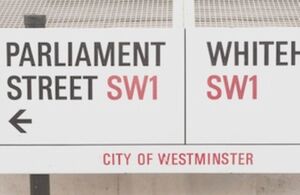Millions get pay rise as National Minimum Wage and National Living Wage increase
Millions of the lowest paid workers across the UK will receive a pay increase as the National Minimum Wage and National Living Wage rise comes into effect.

- The National Living Wage will see an increase of 9.7%, up to £10.42 for workers aged 23+, as well as an increase for younger workers on the National Minimum Wage
- The uplift – worth £1,600 more for a full time worker – will benefit workers in industries like retail, hospitality and cleaning and maintenance, as well as women from ethnic minority backgrounds
- This adds to other government support coming into effect today, including the Energy Price Guarantee, Household Support Fund and bus fare extension
Millions of the lowest paid workers across the UK will from today [Saturday 1 April] receive a pay increase as the National Minimum Wage and National Living Wage rise comes into effect.
The increase will put more money in the pockets of 2.9 million of the lowest-paid workers across the country.
The rate rises include a 9.7% increase in the National Living Wage, from £9.50 per hour to £10.42, the equivalent of more than £1,600 extra per year before tax for someone working full time.
This increase is the largest ever cash increase to the National Living Wage, and highest increase in percentage terms since its introduction in 2016, helping to protect the incomes of millions of workers from high cost-of-living.
Business and Trade Minister Kevin Hollinrake said:
“This government is doing everything it can to support hardworking people with the cost of living – from paying energy bills to helping with childcare.
“Today we are now increasing the National Living Wage to record levels, boosting the incomes of almost 3 million people.
“This pay rise will help families across the country, as we focus on our five priorities, including growing the economy and halving inflation.”
The full increases from 1 April 2023 are:
- National Living Wage (23+) has increased 9.7%, from £9.50 to £10.42
- National Minimum wage (21-22) has increased 10.9%, from £9.18 to £10.18
- National Minimum Wage (18-20) has increased 9.7%, from £6.83 to £7.49
- National Minimum Wage (under 18) has increased 9.7%, from £4.81 to £5.28
- Apprentice Rate has increased 9.7% from £4.81 to £5.28
- The Accommodation Offset also increased 4.6% from £8.70 to £9.10
The 9.7% increase to the National Living Wage today keeps the Government on track to achieve its manifesto commitment for the National Living Wage to equal two-thirds of median earnings by 2024, provided economic conditions allow.
Further government action also comes into effect today to support households with the cost of living, including extending the Energy Price Guarantee at its current level for another three months, which keeps energy bills at £2,500 for a typical household until the end of June. We have also extended the freeze on fuel duty, saving the average car driver in the UK £100 over the next year.
The Department for Work and Pensions have also announced £842 million to help the most vulnerable households across England. The extension of the Household Support Fund, which comes into effect today, gives councils additional cash to directly help the most in need with essential food and energy costs until the end of March 2024.
The Department for Transport have also announced a £2 fare cap for bus users which is being extended until the end of June. This cap will help save passengers money, encourage more people back on the bus and grow the economy.
The National Living Wage and National Minimum Wage have increased every year since their introduction – and this year, there is no exception. The Government is committed to providing both workers and businesses with certainty as we deal with cost-of-living challenges.
The 2023 National Minimum Wage for 21 and 22 years is 52% higher and the National Minimum Wage for apprentices is 60% higher than the 2015 rates.
The uplift will particularly benefit workers in sectors such as retail, hospitality and cleaning and maintenance, as well as women from ethnic minority backgrounds.
Notes to Editors
- If someone is concerned that they’re not being paid the correct wage, they should speak to their employer. If the problem is not resolved, they can contact Acas (the Advisory, Conciliation and Arbitration Service) by phoning 0300 123 1122, or complain to HMRC in confidence using the link www.gov.uk/minimum-wage-complaint. HMRC looks into every single complaint.
- Today’s increase comes on top of far-reaching Government support to help with the cost of living crisis totalling £94 billion to help households with rising bills, including support such as the Cost of Living payment
- The Accommodation Offset is the maximum daily amount which an employer can charge without it amounting to a reduction of pay for National Minimum Wage purposes.
-
You can report possible underpayment of the National Minimum Wage to the ACAS Helpline and also online to HM Revenue and Customs (HMRC):
- https://www.gov.uk/pay-and-work-rights
- https://www.gov.uk/government/publications/pay-and-work-rights-complaints
- To understand the new rates and to get advice, visit GOV.UK/checkyourpay